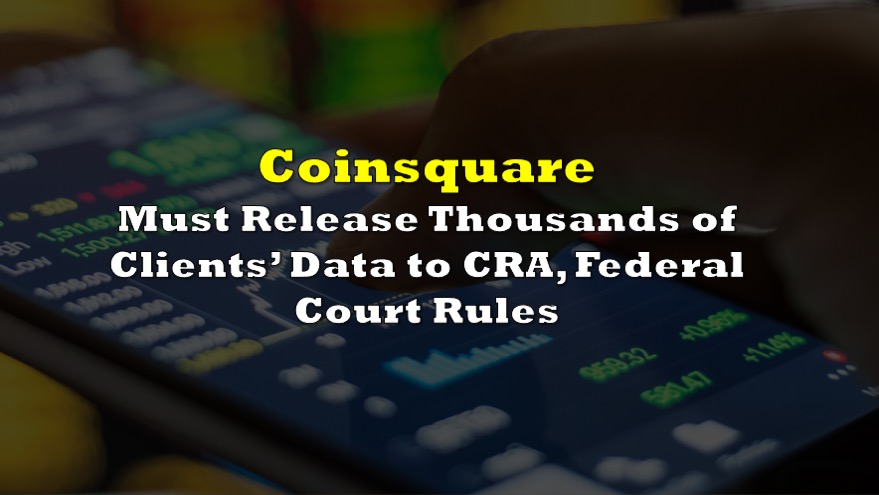One of Canada’s largest cryptocurrency trading platforms will now have to hand over the identities and transaction records for tens of thousands of its users to the Canada Revenue Agency.
According to a Federal Court ruling last week, Coinsquare is being ordered to release data on users that had either deposited or held over $20,000 in an account since January 1, 2013 to the CRA. The trading platform will also have to hand over specific information regarding its top 16,500 users with respect to total earnings and number of transactions over the past six years.
Specifically, Coinsquare must provide the tax agency a comprehensive list of all inactive and active users that meet the distinct criteria, in addition to details regarding the entirety of their trading activity and transfers such as dates, times, deposit addresses, and transaction amounts. According to a CRA statement, the agency is obtaining the information via a legal provision called the Unnamed Persons Requirement (UPR), which allows it to determine if those trading cryptocurrencies are paying applicable taxes.
“Because the CRA does not know the identity of Coinsquare’s customers, a UPR is the only means available to realize this goal. The CRA is currently in the process of serving Coinsquare with the requirement,” a CRA spokesperson told the National Post via email. According to a February interview, CRA head of audits and verification Ted Gallivan said Coinsquare is the first crypto platform that will be subject to the UPR because its name appeared frequently in audits. “Coinsquare came up in a lot of our audits,” he explained. “And so then we decided that that would be the first, but not the last, UPR we filed.”
In response to the latest requirement, Coinsquare acknowledged the ruling was a “partial but significant” achievement for the crypto platform because it was spared from handing over all of its database of clients. “Instead of providing the CRA with all client data dating back to 2013 as was initially requested, Coinsquare and the CRA have agreed that information relating to 90-95 per cent of our clients will not be disclosed,” the trading platform noted in a statement.
The Federal Court’s decision is the first of its kind regarding a crypto platform, and will likely set a precedent for how the CRA will address the rising threat of tax evasion and money laundering via cryptocurrencies going forward.
Information for this briefing was found via Coinsquare and the National Post. The author has no securities or affiliations related to this organization. Not a recommendation to buy or sell. Always do additional research and consult a professional before purchasing a security. The author holds no licenses.









